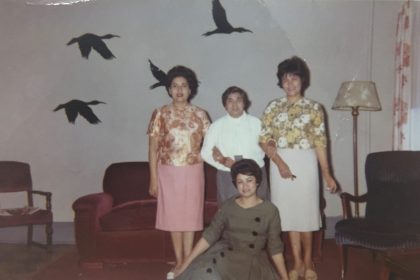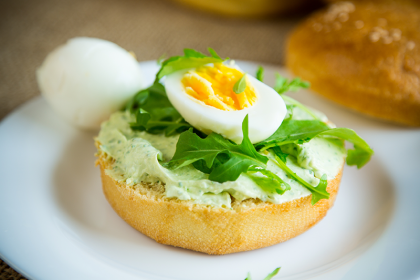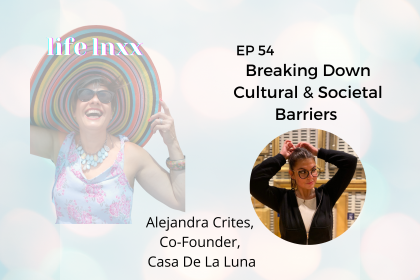[INTRO]
Hola Chicas!
So great to be here with you today; the last Wednesday of May in which we have been honoring Mothers, from human to natural and beyond. It’s been a month of Mother’s Day, Mental Health Awareness, Lunar eclipse and now a long weekend to ease into some hopeful frivolity of summer.
Mothers need a break more than anyone because it’s a lifetime job. For as much joy and soulful energy that comes from becoming a mother, the demand of raising a human through adulthood is insane and rarely made easier. So, continue to show some love for mother’s out there by making their day easier.
Transitioning from One Culture to Multi-Cultural
Today’s episode highlights 3 cultural facets that continue to be passed on in a multi-cultural family. These facets are integral with cultures that live them out naturally in daily routines. Even when families move on to another culture, the culture moves with them, within them in raising future generations.
Families are raised with a love of culture but conflict may pop up when multiple cultures collide. Sometimes this conflict is associated with the cultures, rather than the learning process, and culture is blamed.
It’s a complex scenario because typically, children turn to their parents for advice, kindness and support. But in a multi-cultural family, parents and children don’t share the same childhood experiences. Often, the children are learning on their own and perhaps in conflict with parents. It’s really tricky to live multiple cultures growing up and having little understanding from parents who can’t empathize.
Yet, the experience adds a depth and complexity providing understanding of multiple cultures and multiple generations. Unfortunately, this gift can get lost in the turmoil of trying to navigate this complexity through childhood. Appreciation comes later when differences that hindered in childhood begin to elevate in adulthood.
It’s that DNA that comes forward without effort or thought, regardless of the struggles endured through childhood. Yes, a multi-cultural childhood requires more thought and navigation but this experience nurtures those deeply rooted cultural traits. Traits that are based in love, perseverance and spirituality.
When you think back on your childhood and compare it to today, do you recognize any commonality, any common tendencies that may have resurfaced? Or, maybe you held them close to you all your life. What life moments have you gotten through based on these cultural aspects?
Cafecito Shout Out
As you’re thinking about that for a bit, I’m going to shout out the woman owned coffee business in Berkeley as part of our #steamycafecito moments. It’s our way of supporting small business in any community so if you have one in your neighborhood or a global recommendation, then DM me on our Life Lnxx Instagram or email me through our website, at TheLnxx.com.
This week’s business is really unique. Although not specifically a woman or diverse owned business, it does open it’s doors as a community based coffee roaster. It’s a fab example of allyship that breaks down the barriers of expense blocking out anyone wanting to get into the coffee business. I’ll tell you more about this amazing business at the end of the episode so stay tuned!
Multi-Cultural Childhood Struggles
So, let’s get into today’s topic of three aspects of multicultural living that continue to flourish, generation after generation. It’s exciting to realize that, regardless of how you were raised or what you may have missed growing up, these cultural traits are in you. You are valuable in moving the culture forward.
First, let’s refresh what it’s like to be raised in a multi-cultural family. There’s really two directions tracking as you grow up. Either, aligning with your parents in living cultural norms or moving away from them into a new norm. All you know as a child is what’s learned at home based on cultural traditions. Stepping outside the home is when awareness of differences kicks in and doubt enters.
Like I said, it’s complicated. A multicultural childhood raises a lot of questions that don’t have answers until later in life. Just like a lot of experiences in life, regardless of family heritage, you have to go through it before you can get a sense of what it’s like. Empathy and compassion can only go so far in feeling the reality of being in it.
It’s easier to stay close to the fun cultural aspects like food, music, fashion. But, when it comes to decision making for the future, then it gets tricky. Parents who immigrate may be carrying the anxiety of doing life “right”, for themselves and their family. That’s a lot to worry about.
And again, parents only know what they’ve lived so it’s a double burden of raising kids as new parents – already an unknown – and also raising them in a society far different from their own. Parents may find it easier to stick with what they know. But, this is so different than their own children, and therein lies the struggle.
How to Nurture a Multi-Cultural Life
So, how do you bridge both a cultural and generational chasm that continues to get wider as life goes on? How do you bring the love of culture forward and intact while trying to expand your own generational presence?
Answers to these questions really define the beauty of a multi-cultural family. For as much as it’s a struggle to be learning a new culture while being raised under the standards of another, it’s also a blessing for having so many more options to choose from. In any part of life that may be going sideways, there is another approach that can be used. It’s true in either direction.
The first cultural aspect a child experiences is the love from family. First generation kids really get the most of this because the family is holding tight together in a new culture. So much of what parents bring with them is transferred inside the home through traditions, lifestyle and beliefs.
As kids get older and more aware, they begin to realize how hard their parents are working to sustain the family. Sometimes the amount of work or type of work can seem unjust, especially for women, the mothers, given the social fabric in place. Yet, that work ethic is definitive of the culture and further fueled by the passion to succeed.
Thirdly, in order to hold the first two aspects intact with joy and gratitude, parents bring forth their spirituality. Parents coming from faithful countries have a completely different depth than what is available here. Churches are open 24/7 and people will pass through during their breaks. Conversations of spirituality passed on through generations are common and natural. Even one’s as basic as how the soul moves us through our journey are everyday conversations.
How Multi-Cultural Aspects Play Out
It took me until motherhood to figure this out more thoroughly. I was a slow learn. But it wasn’t until motherhood that I realized the power of my multi-cultural upbringing. I could see how certain values played out once I removed them from my angsty teenage bias. Once she stepped aside, that inner child was free to roam again and she had all the answers.
There is a way to bring forward a cultural relationship, to modernize it into each generation without losing its core values. Each of us has a unique and vibrant way of doing it so, together, the culture lives on. Memories, whether great or questionable, need some revisiting to add more perspective after living some life out there.
So, when you look back on memories of your younger self, what would you want to bring forward? What would you want your children or friends to know about your family, your heritage and your own experiences?
Contemplating this encourages you to define the how and the why. How do you relate to it as part of your cultural heritage? And why is it important to you? Asking yourself these questions helps move beyond impersonal aspects, like rules and traditions, and on to sentimental joy and awesome life skills. It’s less about passing on the heritage for the sake of it and more about your own story.
Revisiting memories helps reframe them with a more worldly perspective. After living through the same childhood experiences as an adult, you may have that ah-ha moment. The “oh, I get it moment” that helps define why parents do what they do.
Modernization is affected by relocation or marriage outside the culture. Yet, with full appreciation of the new complexity, the root culture passes on intact. It’s up to the individual to tap into the culture, bring it forward and live it out loud.
How to Pass On Culture Through Love
So, here’s how these three cultural aspects played out for me through 2 or more generations.
First of all, I have never known greater love and joy than in the Latinx and Hispanic cultures, regardless of relationship to me. I am forever grateful for the warmth and open embrace from this community. It may have started with my mother, but the deep rooted desire to be part of the Latinx life is prevalent in me and I feel blessed.
When it comes to that deep love, there was one memory that jumped to the front when I had my girls. I hadn’t realized how embedded and precious it was until the moment I held my baby for the first time. Suddenly I wanted to pass on the joy of my own childhood bedtime routine.
Every night, my mother would tuck me in tightly on both sides, so tight that I couldn’t move. She would lean in closely, her dark eyes like melted pools of chocolate and begin singing a song from her childhood.
I sing it at the end of the podcast so stay with me. It still makes me tear up and my voice cracks, so be kind. Then, just before turning off the lights, she would put her nose to mine and whisper, “Te quiero, mi hija linda, muñeca, preciosa, wawa….
I did the same for my little ones slowly morphing my mother’s routine into my own. The modernization of that deeply rooted cultural love that creates a fierce bond between mother and child. Even today we share the routine, regardless of where we are in the world.
“Good Night, Sweet Dreams. See you in my dreams. Love you tons and tons, forever…”
How to Pass On Culture Through Life Skills
Aaaah, I love it so much. This sweet embrace, the endearing family relationship, is really the base on which everything else is built. Besitos and abrazos are mandatory and my filter for people I need close to me.
Especially when the second cultural piece kicked in… that hard work ethic. Again, totally blessed to have witnessed and been told about the strong women in my family that created generational wealth. It’s so true about representation – the see it, to be it mentality.
The power of a daily routine, founded in representation, becomes so natural that it seems universal. Again, in childhood, it may be taken for granted but entering the workforce brings it into the spotlight. It’s only then that you realize, wait, what? You mean not everyone does this?
When I was 4 years old, my mother started the family corporation. At that time, she was caring for her mother at our home and had four kids. We didn’t have a nanny or babysitter. Instead, we went to work with her. As we got older, my siblings and I would literally go work for them.
I didn’t think this was strange at the time. I figured every kid did this with their parents. Especially since my grandmother had her own business and my mom went to work for her, doing the bookkeeping. And when I had my girls, they were by my side as I worked from home.
Being part of my parent’s work experience had a subconscious impact for me. The idea of having my own business was automatic, routine, just as it had been for my mother.
It’s those family stories and experiences that frame unique life and leadership skills. Skills that are absent from modern systems because they have been framed on uniformity rather than diversity. For as much as multi-cultural experiences may cause uneasiness or a feeling of being left out, their influence can be equally positive and advantageous. Therein lies the power of diversity.
How to Pass On Culture Through Spirituality
Think about your own multi-cultural experiences and how they may have added complexity and dimension. What leadership skills developed that could be introduced into businesses or education? What do you see that others don’t because of the multi-cultural experiences already lived?
And, did you get through it with an embrace of spirituality? This to me is truly a lifelong journey. As I get older and have lived through so many of life’s harsh realities, the ability to understand them is based on my growing spirituality. Everything from solace and faith during the most frightening of times to gratitude and pure joy for even the simplest of things.
My spirituality is far different from my mother’s yet definitely passed on from her. She was solely religious and we couldn’t have conversations about a broader spiritual belief. Any time I spoke of the soul or the universe, she would grab her rosary and start praying for me.
Don’t get me wrong, I am a deep believer in my Catholic faith. It’s just I feel a more primal, ancestral connection beyond the last 2000 years. Although this continues to grow deeper in me as my journey continues, I felt this as a younger person, too. Being disconnected from my cultural community made it really difficult for me. I had no one to live this with me and confirm this primal sense. I ended up calling it “witchy powers” because for some reason, that is more acceptable here.
The thing is, for as much as my mother spoke only of her religious faith, she actually had witchy powers. I found out at 48! For 48 years, my mother had been giving me the stink eye when she knew, she knew she held the deep primal connection, too. I’ll have to share that story in another episode on witchy powers and premonitions. I know you all have some good stories on this, too. That should be a group interview episode.
Multi-Cultural Empowerment
This is how culture can be lived, modernized and passed on generation to generation. Sharing stories of our ancestors illuminates what we have in common with them because of our culture. You can discover your Life Link and feel grounded in who you come from. It becomes your own story and how others will identify you with love.
Again, it’s not just about passing on the traditions and knowledge of your heritage but how you embody it; how it becomes part of your identity as you walk out in the world. And the world needs your full multicultural self. In this complexity, you can be the bridge between cultures and between generations.
You bring the knowledge of ancients into the modern day, living empathetic love in each small act, providing soul-utions to unsolved problems and letting go of surface anxiety by diving into the depths of spirituality.
Are you excited to bring your multicultural self forward to share with friends, family and coworkers? Feeling empowered to live your complex person out loud? I hope so. The world needs you to remind it of humanity’s compassion and brilliance.
Show Us Your Cafecito Moments!
Now, for the #steamycafecito moment. I hope you were following the hints on our Instagram Stories. If you missed our previous shoutouts of these amazing businesses, then you can find them on our Instagram highlights under the Cafecito icon. The highlights have the episode number related to the pics so you can learn about the owner’s history and passion for starting their businesses. Choose a favorite and order up some coffee or cute merch online!
This week’s business is called the CoRo Coffee Room, see what they did there? It’s located in Berkeley, California and was founded on a deep sense of community. You definitely feel the focus is more about other people than themselves as soon as you walk in the door. How, you ask?
CoRo supports individuals, like you and me, small business owners and larger ones, too, who just want to create their own personal brand. The beauty of supporting small companies is that they focus on sustainable coffee; coffee that is sourced from small farmers, marginalized groups of growers and respectful pricing to create a more equitable supply chain of coffee.
Your cafecito never tasted so good knowing you have done so much good in buying from these partners of CoRo Coffee Room. They also sell the products in the cafe as well as partner companies, like husband and wife team, THE MIDWIFE AND THE BAKER (www.themidwifeandthebaker.com) for their scrumptious goodies, and BLUE WILLOW TEA (www.bluewillowtea.com), a “one woman labor of love” owned by Ali Roth.
You can check out their site at corocoffeeroom.com to discover more about the individual companies, their purpose and order online from them in support. If you are in the area, you can actually see the machines that are used to roast the coffee. Needless to say, it smells lush in there! You can also see the links to these companies in our transcripts at TheLnxx.com, that’s L N Double X.
Ciao!
Remember to tag Life Lnxx in your favorite cafecito moments, especially in your own neighborhood. Develop a sense of community around your Cafecito moments just like CoRo. Maybe we should do a group coffee roasting event or wine making event? What would that taste like, nose of sassiness, lingering love, laughter upfront? All the Latina-ness of good living!
Take a look on our website at TheLnxx.com for each episode’s transcripts and the articles linked to what you’ve heard here today.
Share the love of this podcast with your friends and leave a review for us on Apple Podcasts so we can stay in conversation.
Step into your truth, ladies. I love you! Ciao!
[Outro]




